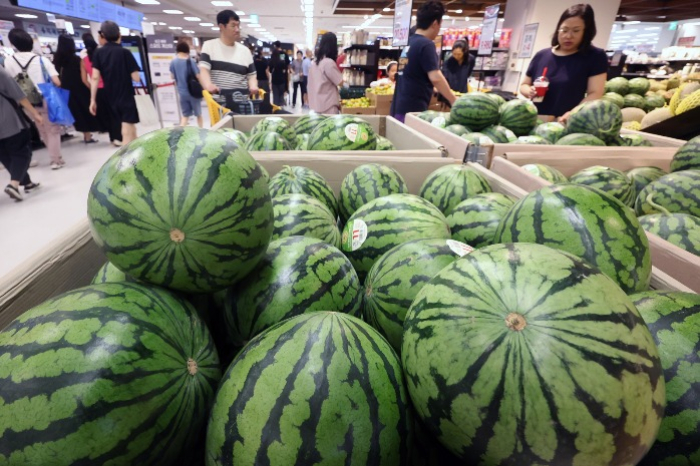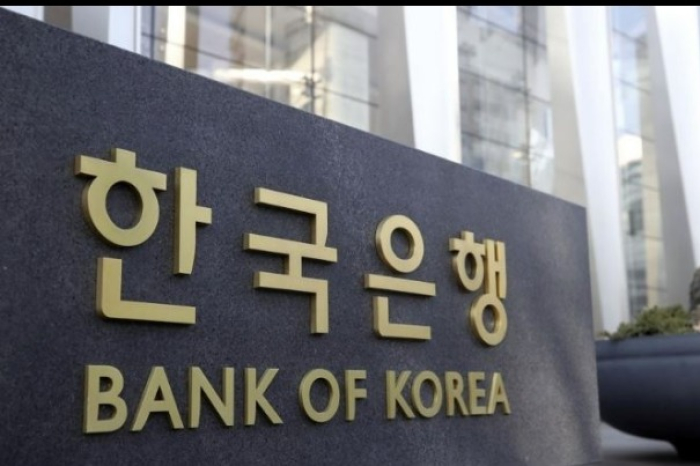Economy
BOK in limbo on rate decison with July inflation below 3%
The country’s headline inflation reaccelerated by 2.6% but stayed below 3% for the fourth straight month in July
By Aug 02, 2024 (Gmt+09:00)
3
Min read
Most Read
Samsung steps up AR race with advanced microdisplay for smart glasses


When in S. Korea, it’s a ritual: Foreigners make stops at CU, GS25, 7-Eleven


Maybe Happy Ending: A robot love story that rewrote Broadway playbook


NPS yet to schedule external manager selection; PE firms’ fundraising woes deepen


US auto parts tariffs take effect; Korea avoids heavy hit



South Korea’s headline inflation remained in the 2% range for the fourth straight month in July despite a reacceleration, complicating the Bank of Korea’s rate decision amid mounting household debt and weakening domestic spending.
Consumer prices in July increased 2.6% from a year ago, data released by Statistics Korea showed on Friday.
The acceleration is faster than last month’s 2.4% gain but stayed below 3% for the fourth month in a row, indicating that Korea's headline inflation will likely trend down toward the central bank's 2% inflation target.
The country’s annual core inflation less food and energy prices tracked by the Organization for Economic Co-operation and Development (OECD) increased 2.2% from a year ago, unchanged for three consecutive months.
The government attributed an uptick in headline inflation to torrential rains during the country’s summer monsoon season and higher international oil prices.
South Korea’s consumer inflation
(Unit: %)
Agricultural, livestock and fishery prices added 5.5% year-on-year last month, largely driven by high fresh fruit prices, which leaped 21.3% over the same period. As a result, farm products’ contribution to inflation stood at 0.34 percentage point.
Petroleum product prices rose 8.4%, their highest gain since October 2022.
The finance ministry expects the country’s inflation to stay in the low- to mid-2% range for the rest of this year after moderating in August, said Kim Beom-seok, first vice minister of Korea’s Economy and Finance Ministry.
However, growing geopolitical risk in the Middle East and extreme weather conditions remain uncertainties that could affect the country’s consumer price trend, he added.
BOK IN LIMBO
Korea’s latest inflation figure heightened expectations for the BOK’s imminent rate cut.
It could consider rate cuts once it confirms that inflation stays in the 2.3%-2.4% range in the second half, BOK Governor Rhee Chang-yong said after the bank left the policy rate unchanged at 3.50% in May.
The rate remained at the same level at the subsequent monetary policy meeting in early July for the 12th straight time when Governor Rhee said the time was ripe to prepare a rate cut.

But he remained undecided about the timing for a cut, citing the country’s snowballing household debt and the weak Korean currency against the US dollar.
The outstanding balance of household lending by Korea’s five commercial banks stood at 715.74 trillion won ($520 billion) at the end of July, up by 7.17 trillion won, or 1%, from the previous month, industry data showed on Thursday.
Domestic real estate prices have rebounded in the recent months.
But overall domestic consumption has slowed, suggesting that the BOK can’t ignore calls for rate cuts.
The US Federal Reserve’s strong signal for a rate cut in September is also expected to pressure its Korean peer into trimming rates.
The market expects the BOK may pivot in October after it confirms the government’s fresh measures to tame the country’s sizzling real estate market.
Korea’s treasury bond yields fell to their lowest points in more than two years early this week, slipping below the 3% level for the first time since April 2022 as the country’s unexpected economic downturn in the second quarter raised expectations of at least two rate cuts this year.
Write to Kyung-Min Kang at kkm1026@hankyung.com
Sookyung Seo edited this article.
More to Read
-
 Central bankBOK chief signals rate cut; warns of rising housing prices
Central bankBOK chief signals rate cut; warns of rising housing pricesJul 11, 2024 (Gmt+09:00)
3 Min read -
 EconomyS.Korea’s July household debt grows at fastest pace in over 3 years
EconomyS.Korea’s July household debt grows at fastest pace in over 3 yearsAug 01, 2024 (Gmt+09:00)
2 Min read -
 MarketsKorean treasury yields fall to lowest level in over 2 years
MarketsKorean treasury yields fall to lowest level in over 2 yearsJul 30, 2024 (Gmt+09:00)
3 Min read -

-
 EconomyS.Korea’s inflation holds below 3% for 3rd straight month
EconomyS.Korea’s inflation holds below 3% for 3rd straight monthJul 02, 2024 (Gmt+09:00)
2 Min read
Comment 0
LOG IN


